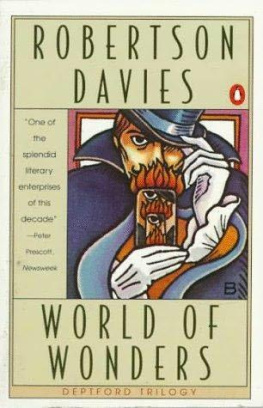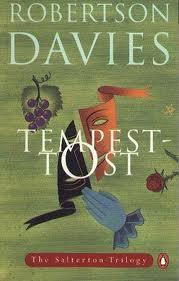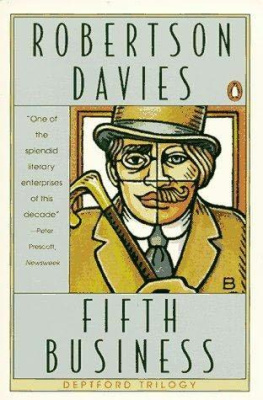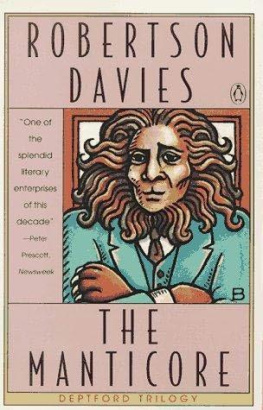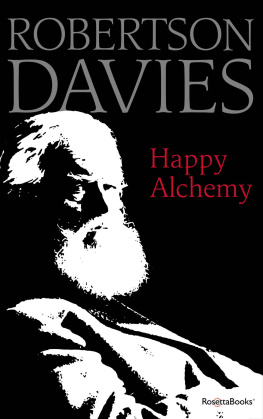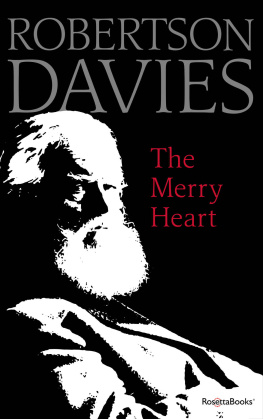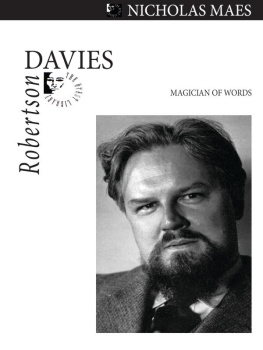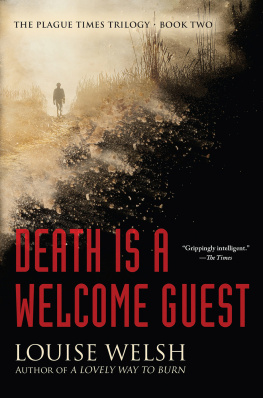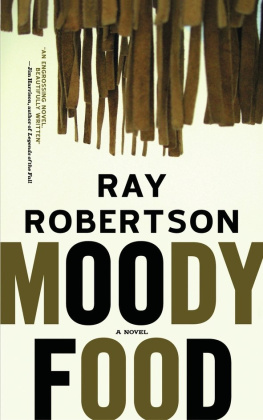World of Wonders
The Deptford Trilogy #3
by Robertson Davies
eVersion 4.0 / See notes at EOF
ISBN 0 14 01.4755 1 (Entire Trilogy)
-- I --
A Bottle in the Smoke
"Of course he was a charming man. A delightful person. Who has ever questioned it? But not a great magician."
"By what standard do you judge?"
"Myself. Who else?"
"You consider yourself a greater magician than Robert-Houdin?"
"Certainly. He was a fine illusionist But what is that? A man who depends on a lot of contraptions -- mechanical devices, dockwork, mirrors, and such things. Haven't we been working with that sort of rubbish for almost a week? Who made it? Who reproduced that Patissier du Palais-Royal we've been fiddling about with all day? I did. I'm the only man in the world who could do it. The more I see of it the more I despise it."
"But it is delightful! When the little baker brings out his bonbons, his patisseries, his croissants, his glasses of port and Marsala, all at the word of command, I almost weep with pleasure! It is the most moving reminiscence of the spirit of the age of Louis Philippe! And you admit that you have reproduced it precisely as it was first made by Robert-Houdin. If he was not a great magician, what do you call a great magician?"
"A man who can stand stark naked in the midst of a crowd and keep it gaping for an hour while he manipulates a few coins, or cards, or billiard balls. I can do that, and I can do it better than anybody today or anybody who has ever lived. That's why I'm tired of Robert-Houdin and his Wonderful Bakery and his Inexhaustible Punch Bowl and his Miraculous Orange Tree and all the rest of his wheels and cogs and levers and fancy junk."
"But you're going to complete the film?"
"Of course. I've signed a contract. I've never broken a contract in my life. I'm a professional. But I'm bored with it. What you're asking me to do is like -- asking Rubinstein to perform on a player-piano. Given the apparatus anybody could do it."
"You know of course that we asked you to make this film simply because you are the greatest magician in the world -- the greatest magician of all time, if you like -- and that gives tremendous added attraction to our film --"
"Its been many years since I was called an added attraction."
"Let me finish, please. We are presenting a great magician of today doing honour to a great magician of the past. People will love it."
"It shows me at a disadvantage."
"Oh, surely not. Consider the audience. After we have shown this on the B.B.C. it will appear on a great American network -- the arrangements are almost complete -- and then it will go all over the world. Think how it will be received in France alone, where there is still a great cult of Robert-Houdin. The eventual audience will be counted in millions. Can you be indifferent to that?"
"That just shows what you think about magic, and how much you know about it. I've already been seen all over the world. And I mean I've been seen, and the unique personal quality of my performance has been felt by audiences with whom I've created a unique relationship. You can't do that on television."
"That is precisely what I expect to do. I don't want to speak boastfully. Perhaps we have had enough boasting here tonight. But I am not unknown as a film-maker. I can say without immodesty that I'm just as famous in my line as you are in yours. I am a magician too, and not a trivial one --"
"If my work is trivial, why do you want my help? Film -- yes, of course its a commonplace nowadays that it is an art, just as people used to say that Robert-Houdin's complicated automatic toys were art. People are always charmed by clever mechanisms that give an effect of life. But don't you remember what the little actor in Noel Coward's play called film? 'A cheesy photograph'."
"Please --"
"Very well, lets not insist on 'cheesy'. But we can't escape 'photograph'. Something is missing, and you know what it is: the inexplicable but beautifully controlled sympathy between the artist and his audience. Film isn't even as good as the player-piano; at least you could add something personal to that, make it go fast or slow, loud or soft as you pleased."
"Film is like painting, which is also unchanging. But each viewer brings his personal sensibility, his unique response to the completed canvas as he does to the film."
"Who are your television viewers? Ragtag and bobtail; drunk and sober; attentive or in a nose-picking stupor. With the flabby concentration of people who are getting something for nothing. I am used to audiences who come because they want to see me, and have paid to do it. In the first five minutes I have made them attentive as they have never been before in their lives. I can't guarantee to do that on tv. I can't see my audience, and what I can't see I can't dominate. And what I can't dominate I can't enchant, and humour, and make partners in their own deception."
"You must understand that that is where my art comes in. I am your audience, and I contain in myself all these millions of whom we speak. You satisfy me and you satisfy them, as well because I credit them with my intelligence and sensitivity and raise them to my level. Have I not shown it in more than a dozen acknowledged film masterpieces? This is my gift and my art. Trust me. That is what I am asking you to do. Trust me."
This was the first serious quarrel since we had begun filming. Should I say "we"? As I was living in the house, and extremely curious about everything connected with the film, they let me hang around while they worked, and even gave me a job; as an historian I kept an eye on detail and did not allow the film-makers to stray too far from the period of Louis Philippe and his Paris, or at least no farther than artistic licence and necessity allowed. I had foreseen a quarrel. I was not seventy-two years old for nothing, and I knew Magnus Eisengrim very well. I thought I was beginning to know a little about the great director Jurgen Lind, too.
The project was to make an hour-long film for television about the great French illusionist. Jean-Eugene Robert-Houdin, who died in 1871. It was not simply to mark this centenary; as Lind had said, it would doubtless make the rounds of world television for years. The title was Un Hommage a Robert-Houdin -- easily translatable -- and its form was simple; the first twelve minutes were taken up with the story of his early life, as he told it in his Confidences d'un prestidigitateur, and for this actors had been employed; the remainder of the hour was to be an historical reproduction of one of Robert-Houdin's Soirees Fantastiques as he gave it in his own theatre in the Palais-Royal. And to play the part of the great conjuror the film-makers and the British Broadcasting Corporation had engaged, at a substantial fee, the greatest of living conjurors, my old friend Magnus Eisengrim.
If they had filmed it in a studio, I do not suppose I should have been involved at all, but the reproduction of Robert-Houdin's performance demanded so much magical apparatus, including several splendid automata which Eisengrim had made particularly for it, that it was decided to shoot this part of the picture in Switzerland, at Sorgenfrei, where Eisengrim's stage equipment was stored in a large disused riding-school on the estate. It was not a difficult matter for the scene designers and artificers to fit Robert-Houdin's tiny theatre, which had never seated more than two hundred spectators, into the space that was available.
This may have been a bad idea, for it mixed professional and domestic matters in a way that could certainly cause trouble. Eisengrim lived at Sorgenfrei, as permanent guest and -- in a special sense -- the lover of its owner and mistress, Dr. Uselotte Naegeli. I also had retired to Sorgenfrei after I had my heart attack, and dwelt there very happily as the permanent guest and -- in a special sense -- the lover of the same Dr. Uselotte, known to us both as Liesl. When I use the word "lover" to describe our relationship, I do not mean that we were a farcical
Next page
